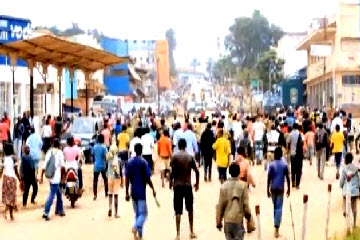
The protesters, many of them students, attacked buildings used by the United Nations mission in DR Congo, known as MONUSCO, whose peacekeepers they accuse of letting the M23 march into Goma unopposed after saying for months they would not let the city fall into the rebels’ hands.
A resident told Radio France Internationale (RFI) during the protest that “we are heading straight to MONUSCO to tell them that if they don’t want to protect the Congolese population, they should leave. And we are going to take care of ourselves because we are tired.”(Audio)
Another resident told RFI that “people have had enough. People have kept these feelings inside them and now, today they are exploding.”
The anger also turned toward President Joseph Kabila’s PPRD political party headquarters and security forces. Tires were burned along some streets to keep police vehicles away as some government and PPRD were attacked.
The protests in Bukavu mirror those that took place on Tuesday in Kisangani and Bunia in which the M23, the PPRD and MONUSCO were the targets.
The M23 rebels have said that Bukavu, a bigger city than Goma and the capital city of South Kivu province, is their next target.
Women protested in Kinshasa in front of MONUSCO headquarters, heavily guarded by UN peacekeepers and the police, singing “MONUSCO should go, they don't do their job.” Other protests are being planned across the country and abroad. In Brussels, Belgium, protesters occupied the Congolese embassy on Wednesday to protest the government’s inability to stop the M23 rebellion.
President Kabila, who has been in office since 2001, is increasingly seen as incapable of solving the security problems that have plagued eastern Congo since the late nineties. The same is true for the UN peacekeeping mission, which was established in 1999.
But, as much as Mr. Kabila’s leadership has once again been put into question by the latest unrest, the M23 rebels are far more unpopular. The vast majority of Congolese see them as nothing more than an extension of the Rwandan army used to assert control over eastern Congo and its vast mineral resources.
Human Rights groups have documented how the M23 has relied on forced recruitments to boost its ranks in the areas it controls. Hundreds of thousands of people have fled towns and villages as the rebels were approaching. Those who stay and resist are summarily executed.
The M23 rebels claim they want to “liberate” DR Congo. The problem is, as much as the Congolese may not like their current leaders, they don’t consider the M23 rebels as liberators but rather as invaders.
Related articles
- • DRC and Rwanda Sign Declaration of Principles for Peace in Eastern Congo (April 25, 2025)
- • European Union Sanctions Rwanda and M23 Officials over Congo Conflict (March 17, 2025)
- • Canada and Germany Impose Sanctions on Rwanda for Supporting M23 Rebels (March 4, 2025)
- • UK Suspends Financial Aid to Rwanda Over M23 Rebellion (February 25, 2025)
- • European Union Suspends Defence Consultations with Rwanda (February 24, 2025)
- • Tshisekedi Announces Government of National Unity and Calls for Unity Against M23 Rebels (February 23, 2025)
- • UN Security Council Calls on Rwanda to Stop Supporting M23 Rebels in DR Congo (February 22, 2025)
- • US Sanctions Rwanda's Minister James Kabarebe for Central Role in DR Congo Conflict (February 20, 2025)
- • Rwanda-Backed M23 Rebels Summarily Executed Children in Bukavu, UN Reports (February 19, 2025)
- • DR Congo Citizens Head to Polls to Elect President, Members of Parliament (December 20, 2023)
- • 'Deadly environment' plus 'political and social' obstacles hinder Ebola fight, Security Council hears (July 24, 2019)
- • Ebola outbreak declared an international Public Health Emergency (July 17, 2019)
- • Felix Tshisekedi Sworn In as DR Congo President (January 24, 2019)
- • Constitutional Court Declares Tshisekedi Winner of Presidential Election (January 19, 2019)
- • Felix Tshisekedi Vows to Be the President of All Congolese (January 10, 2019)
- • Felix Tshisekedi Elected DR Congo President (January 10, 2019)
- • DR Congo Delays Results of December Election (January 6, 2019)
- • Jean-Pierre Bemba Returns to DR Congo (August 1, 2018)
- • At least 30 dead after massacres in Ituri (March 2, 2018)
- • Botswana Urges Joseph Kabila to Step Down (February 26, 2018)
- • No elections in DR Congo in December without electronic voting machines: INEC (February 13, 2018)
- • US Warns DR Congo Against Electronic Voting for Delayed Election (February 12, 2018)
- • Felix Tshisekedi accuses INEC of illegally prolonging Kabila's mandate (October 24, 2017)
- • DRC Seeks Arrest of Presidential Candidate Moise Katumbi (May 19, 2016)
- • Papa Wemba Is Buried in Kinshasa (May 4, 2016)
- • Papa Wemba Awarded Highest National Honor as Thousands Pay Tribute (May 2, 2016)
- • DR Congo reach final of African Nations Championship (February 3, 2016)
- • Peacekeepers, Congo Army to Resume Joint Fight Against Rwandan Rebels (January 28, 2016)
- • Political tensions 'running high' in DR Congo ahead of 2016 elections (October 7, 2015)
- • UN Report Blames Ugandan Islamists for 237 Killings in DR Congo (May 14, 2015)







